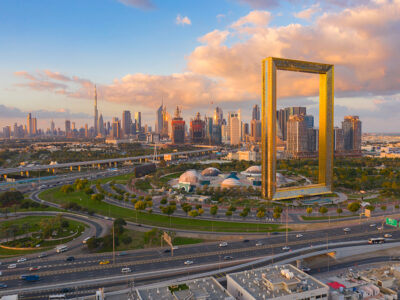British expats have been warned not to try to travel back to the UK through ‘green list’ countries to avoid quarantine rules.
The UAE will remain on the UK travel red list for the foreseeable future, the British government announced on Friday. The ruling means all UAE residents and expats travelling to Britain are required by law to travel straight to a government-mandated hotel for 10 days at a cost of £1,750 per adult.
Only 12 countries were added to the UK’s ‘green list’ for quarantine-free travel from May 17, including Portugal, Gibraltar, Iceland, Australia, Singapore and Israel.
Following reports of Brits seeking to bend the rules by hopping back home via green list countries, experts have advised against this strategy.
“The quarantine rules in the UK apply to anyone who has been in the UAE within the last 10 days and not only to travellers arriving directly from the UAE,” said Bruno Trenchard (pictured below), senior manager – hotels and hospitality at strategy consultants CBRE.
“The most motivated travelers might resort to alternative routes that would include spending at least 10 days in a non-red list country after which they would go to the UK. But this has negative implications in terms of travel budget and timeframes,” he added.

According to an expert UK aviation analyst, who asked not to be named, illegitimate trips to the UK by UAE travellers are happening “all the time”.
“The government has no way of tracking it and is turning a blind eye to the whole issue,” the source said.
“The best way – although it is a long detour – is via Lisbon, or anywhere in Portugal, if the traveller feels that their journey is that pressing. And I say that because personally I wouldn’t risk it and, if caught, the fine is significant.”
The current fine for breaking UK quarantine law is a hefty £10,000. Several penalties have already been meted out to UAE travellers in the last few weeks, according to UK press reports.
The UK government is reviewing its travel list in the next three weeks and will continue to do so in three-week increments, unless concerning evidence means the government needs to act faster to protect public health.
“The first potential updates to the lists could be announced in the first week of June for implementation the week after,” a UK Department for Transport spokesperson told Arabian Business in an email.
“We believe that we have set out a pragmatic approach, protecting public health while also enabling international travel to restart again,” the spokesperson added.
The UK government’s decisions on categorising countries are informed by the Joint Biosecurity Centre (JBC), which produces risk assessments of the spread of variants of concern internationally.
Decisions on red, amber or green list assignment and associated border measures are taken by ministers after reviewing the latest scientific data and JBC’s risk assessment, as well as wider public health factors.
The full UK green list
- Portugal
- Israel
- Singapore
- Australia
- New Zealand
- Brunei
- Iceland
- Gibraltar
- Falkland Islands
- Faroe Islands
- South Georgia and the Sandwich Islands
- St Helena, Tristan de Cunha and Ascension Island
Explained: The UK travel ‘traffic light’ list
Green: Arrivals need to take a pre-departure test as well as a PCR test on or before day two of their arrival back into the UK – but will not need to quarantine on return (unless they receive a positive result) or take any additional tests
Amber: Arrivals will need to quarantine for a period of 10 days and take a pre-departure test, as well as a PCR test on day two and day eight. There will be the option to take an additional test on day five to end self-isolation early
Red: Arrivals will be subject to restrictions currently in place for red list countries, which include a 10-day stay in a managed quarantine hotel at a cost of £1,750 per adult, pre-departure testing and mandatory PCR testing on day two and eight.





